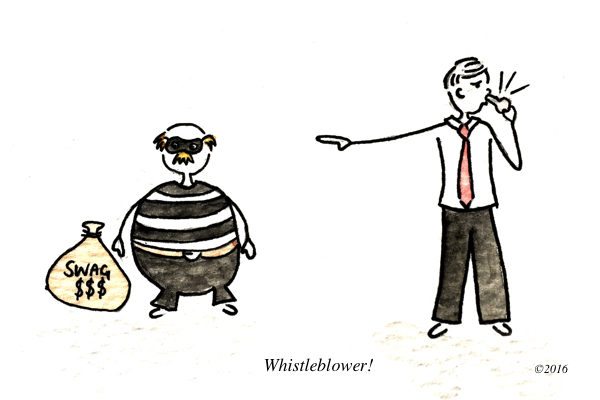Protected disclosure, more commonly known as whistle blowing, describes the situation when an employee feels compelled to make a disclosure (blow the whistle about) ‘serious wrongdoing’. Effectively, any one or more of the following:
- Criminal offences;
- Failure to comply with legal obligations;
- Miscarriages of Justice;
- Danger to health and safety;
- Environmental Damage;
- Deliberate concealment of any of the above.
An employee must reasonably believe that the disclosure is true or likely to be true.
How to make a protected disclosure

An employee should make the disclosure in accordance with an organisation’s internal procedures if they exist. If no such procedures exist or if the person that you are supposed to make the disclosure to is involved in the wrongdoing themselves then you can make the disclosure to a more senior person or even a person or organisation outside of the company.
It’s a good idea if you need to blow the whistle to do so in writing or to make sure that you have some kind of evidence that any conversation about wrongdoing took place.
Example
John works for Rob who runs a small building firm. John is working on an office refurbishment when it becomes apparent that much of the building has been lined with asbestos insulation. John tells Rob about the asbestos and says he thinks they should get specialist advice about the asbestos or at least that he should be provided with appropriate training and protective equipment. Rob tells him that he has always worked with asbestos and he is worrying about nothing. John would be quite justified in reporting the incident to the Health and Safety Executive.
What to do if you are treated less favourably or dismissed once you have blown the whistle?
It is not uncommon for organisations or their staff to retaliate in a negative way when employees make protected disclosures about them. This could be treating whistle blowers in a different or more negative way than other staff: for example denying them promotion; cancelling overtime; refusing holiday requests; not inviting them to company parties or events because they are “not a team player”. It can even result in the dismissal of the whistle blower.
Fortunately, the law protects those who bring wrongdoing out into the open and employees can make claims to Employment Tribunals if they are subjected to unfavourable treatment or dismissed as a result of blowing the whistle.
Who is protected?
Employees, workers, agency staff, contractors, trainees and those on secondment are all protected by law if they raise issues about wrongdoing at their place of work.
What about confidentiality clauses?
Confidentiality clauses or gagging clauses in contracts cannot operate to prevent employees from raising genuine concerns about wrongdoing.
Example
Continuing the example above:
Rob calls John at home on a Sunday night and angrily tells him not to bother coming into work again as he cannot stand disloyalty and can’t trust him to keep his mouth shut. He says that the business is struggling enough already without trouble makers like him and therefore he is “letting him go”. John can issue a claim to an employment tribunal for automatic unfair dismissal.
——————————————————————————————–

